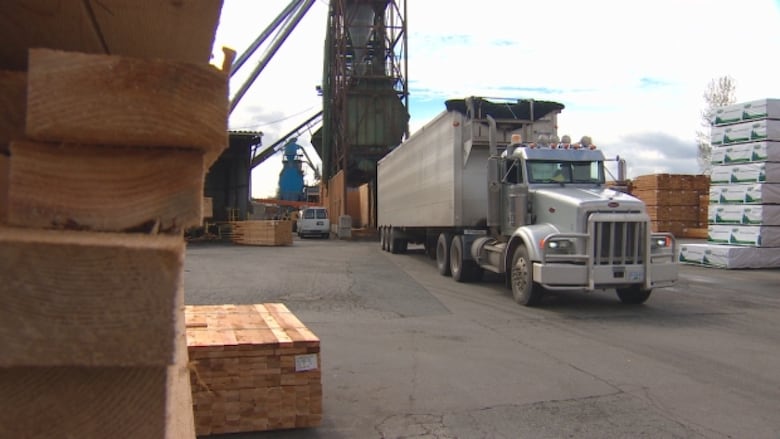Federal government is recognizing northwest Ontario's softwood lumber sector, says Minister Patty Hajdu
Latest plan for the sector includes funds for loan guarantees and product diversification.

The federal government is providing $1.2 billion to support Canada's ailing softwood lumber industry, amidst an ongoing trade war with the United States. Prime Minister Mark Carney made the announcement on Tuesday in British Columbia.
U.S tariffs have hit the sector particularly hard, with the U.S. Commerce Department most recently increasing anti-dumping duties on softwood lumber to 20.56% in late July. In 2024, roughly 66 percent of Canadian softwood lumber products were exported, with 90 percent of exports shipped to the U.S., according to the Prime Minister's office.
"Many of us who have grown up in northern Ontario have seen the impacts of any attack on the softwood lumber industry," says Patty Hajdu, Member of Parliament for Thunder Bay - Superior North, and the minister responsible for Federal Economic Development Agency for Northern Ontario (FedNor).
"We've been vocal as a region about the importance of this sector, not just to the economy of northern Ontario, but to the economy of Canada."
The federal government's job bank estimates that in 2023, 29.2 percent of employment for forestry, logging and support activities were concentrated in the province's northwest economic region alone, while the northeast economic region accounted for a further 20.8 percent.
When combined with previously imposed tariffs, the latest duties raise the total tariff rate on Canadian softwood lumber to 35 percent, something Marathon, Ont. mayor Rick Dumas says is "devastating" for the industry.
"In my backyard, 37 municipalities have a lot of saw mills operating and of course that impacts a lot of families and individuals in the uncertainty of that," said Dumas, who also serves as the president of the Northwest Ontario Municipal Association (NOMA).

Shortly after the U.S. hiked duties on Canadian softwood lumber, NOMA and Thunder Bay's chamber of commerce released a joint statement and called upon the federal government to work with forestry sector stakeholders to develop a mitigation plan.
The federal government's plan for softwood lumber includes $700 million to ensure the necessary financing and credit needed by companies to maintain operations. Also, $500 million to drive product diversification in the softwood lumber sector through research and innovation, and an additional $50 million to increase skilled labour training and income supports.
More than just lumber
Increased funding for diversifying softwood lumber products comes on the heels of recent funding from the Ontario government to increase biomass development in the northwest region.
Thunder Bay's pulp and paper mill is among a number of companies in the region looking at ways that leftover wood chips can be utilized in farmers fields and as green energy using sludge processing.
"It's been fascinating as a Member of Parliament to meet with researchers, with companies, small, medium and large, who are looking at innovative ways to use forest products to create new products that are needed around the world," Hajdu said, adding the investment "make the industry more competitive over the long term and to use technology and new innovative forest products to help Canada reach their net zero goal by 2050."
In my backyard, 37 municipalities have a lot of saw mills operating and of course that impacts a lot of families and individuals in the uncertainty of that,- Rick Dumas, mayor of Marathon, Ont. and president of the Northwestern Ontario Municipal Association
Hajdu adds the country's regional economic development agencies also received millions of dollars to help small and medium sized businesses pivot their product lines and customer bases. The softwood lumber industry can sometimes be the central sector of employment for small communities in northwestern Ontario.
"I've lived through a couple of different downturns in the forestry sector in my community here in Marathon and my neighbouring communities throughout the northwest who really were devastated through the [2008] global recession, and we know exactly how the impact is when you lose a sawmill," Dumas said.
"This is a great announcement and we look forward to continue working with the federal government, and of course with our provincial government."
Plans to expand globally
The statement by NOMA and Thunder Bay's chamber of commerce in late July also claimed the softwood lumber industry has faced "unjust and punitive" duties since the last Canada-U.S. softwood lumber agreement expired in 2016. Carney's announcement on Tuesday included plans to help Canada diversify its export market for softwood lumber beyond the United States.
The announcement also aims to mandate companies contracted by the federal government to source Canadian lumber, and ensure Canadian lumber is used as part of its Build Canada Homes program.

The program is set to begin this fall, promising to build 500,000 new homes over the next decade.
"There's an opportunity in all of this to support Canadian companies by investing in ourselves, including through housing and other national infrastructure projects," Hajdu said.

